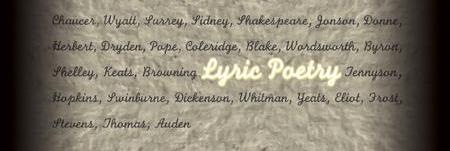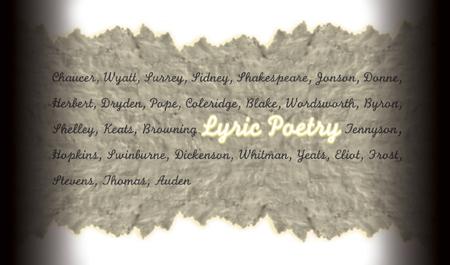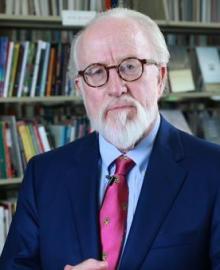Location:
Poetry is capable of saving us; it is a perfectly possible
means of overcoming chaos.
--I. A. Richards
Words for music perhaps.
--W. B. Yeats
Very likely the earliest form of literary expression, the lyric poem is a relatively short statement in verse, usually in the first person, and deals with emotionally charged subject matter, such as unrequited love, personal loss, celebration, or religious meditation. This seminar will address itself principally to lyric poems in English from the late medieval to the modern period. Authors will include Chaucer, Wyatt, Surrey, Sidney, Shakespeare, Jonson, Donne, Herbert, Dryden, Pope, Coleridge, Blake, Wordsworth, Byron, Shelley, Keats, Browning, Tennyson, Hopkins, Swinburne, Dickinson, Whitman, Yeats, Eliot, Frost, Stevens, Thomas, and Auden.
The first meeting will introduce and illustrate some of the distinctive rhetorical devices of verse—meter, rhyme, metaphor, and so on—and some of the main lyric genres—sonnet, epigram, epitaph, elegy. Each of the nine subsequent meetings will center on some half dozen poems spanning the centuries. The procedure will be to read the poems, that is, to listen to their being declaimed and to inquire into their meaning and significance.
The approach will require particular attention to the unique principle of order that each poem establishes. The order is linguistic and expresses a semantic meaning. The order is also rhythmical and phonetic, and ultimately suggests music—a kind of literal music, so to speak. Accordingly, each meeting of the seminar will conclude with a consideration of one or two poems that have been set to music by composers, including Schubert, Brahms, Mahler, Strauss, and Britten.
The aim of the seminar is to gain a sense of how lyric poetry means and how it provokes feelings—how in the final analysis it discloses insight that can illuminate, if not counter, the chaos of human experience.
Required Reading:
A required FASTCOPY packet will have to be pre-ordered on the first day of class in the Poetry Center lobby and will be ready for pick-up at the second class meeting. The cost for the reading packet is $16.50 plus tax.







